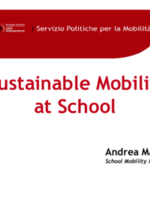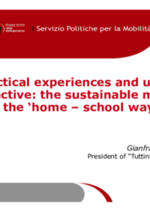CIVITAS study visit shows cities how to get children cycling and walking

Would you rather travel to school by shark or by duck? Dressing up bikes as animals is just one of the many approaches used in Reggio Emilia to get children in the saddle.
As part of the latest CIVITAS study visit, six cities from six countries visited Reggio Emilia, Italy, for two days to learn about its methods for fostering cycling amongst children - without putting them at risk.
Children walk and cycle to school in timetabled groups known as the Pedibus and Bicibus, or "walking bus" and "cycling bus". The children are supervised by volunteers along a clearly signposted route.
Representatives from the cities involved - Kruševac (Serbia); Labin (Croatia); Leon (Spain); Sarajevo (Bosnia); Soissons (France); and Strängnäs (Sweden) - were impressed by what they saw.
Jelena Nikolic, an adviser for sustainable urban mobility in Kruševac, made clear that “all the measures... presented during this study visit... can be implemented in my city. It is not an easy task, but possible”.
That the measures demonstrated on the study visit - arranged as part of the 2017 CIVITAS peer exchange programme - “are free or have a low cost and are still very effective” was exciting for Alina Akhmerova from Soissons.
Participants also found out about the temporary car-free zones put in place around schools at the times when children arrive and leave, as well as the balance bicycles and workshops that encourage nursery-age children in the city to learn about cycling.
In Reggio Emilia, all schools are required by law to have a mobility manager, a voluntary position which links the municipality and schools.
The combination of car-free zones and having children travel to school using active transport modes serves a dual purpose. It makes children enthusiastic about sustainable modes of transport, and reduces the amount of pollution they are exposed to, as fewer parents use their cars for the school run. Both outcomes entail clear health benefits.
Following the study visit, there might be a few more sharks and ducks making the journey to school across Europe.
Author: Matilde Chinellato














